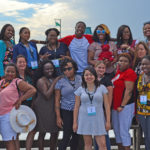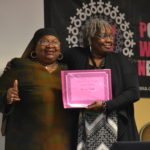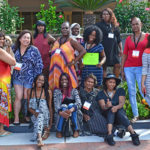Positive Women’s Network – USA (PWN-USA) hosted SPEAK UP! 2016, our second national leadership summit for women living with HIV, in Ft. Walton Beach, FL, September 27-30, 2016, bringing together 250 women living with HIV (WLHIV) from 30 states, Puerto Rico, Canada and the U.S. Virgin Islands.
Building upon the success of the first Summit in 2014, SPEAK UP! 2016 was designed to develop leadership skills, discuss timely policy, legal and research trends relevant to women’s lives, and strategize to support organizing and advocacy at the federal and state levels.
The Summit created a much-needed space for WLHIV to focus on policy and research issues uniquely relevant to women and to support and mentor each other, with those new to advocacy learning from seasoned advocates. Such training–and spaces–are necessary, as women’s issues are frequently overlooked in HIV policy, despite women making up about a quarter of the domestic epidemic.

Goals of SPEAK UP! 2016:
- increase participants’ knowledge of current policy and research trends;
- increase participants’ ability to use an intersectional lens in their work; and
- build participants’ skills to lead, organize, and advocate on strategic campaigns oriented towards justice and equity.
Summit Planning Process
SPEAK UP! 2016 was organized almost entirely by women living with HIV. In December 2015, PWN-USA convened a 25-member planning committee consisting of women living with HIV, of varying ages, racial and ethnic backgrounds, and geographical locations.
This planning committee met by conference call for ten months. Subcommittees formed to work on specific needs for the Summit: fundraising and communications, and program and logistics. The subcommittees provided critical input and feedback on the program and logistics; helped draft and review Summit communications and community guidelines; created promotional videos, social media promotions and materials; reviewed and scored workshop proposals; did outreach to potential participants and presenters; and helped develop activities.

Who Came to SPEAK UP?
The Summit Planning Committee and the supporting staff team prioritized the meaningful participation of most impacted communities in SPEAK UP! 2016, both as attendees and presenters. A large majority of participants were low-income.
We were proud to significantly increase participation from the 2014 Summit among young women and women of trans* experience, as well as expanding the number of states represented and the number of women from states most impacted by the  epidemic. 44% of participants hailed from Southern states. Roughly 10% identified as transgender or gender-nonconforming.
epidemic. 44% of participants hailed from Southern states. Roughly 10% identified as transgender or gender-nonconforming.
We also strove to ensure that presenters and facilitators were representative of the communities most impacted by the epidemic:
- 83% of presenters were people living with HIV
- 92% of presenters were women, including women of trans experience
- 11% of presenters identified as transgender or gender-nonconforming
- 68% of presenters identified as a racial or ethnic minority (55% Black/African American, 7% Latinx, 6% Asian/Pacific Islander)
The Program
Prior to the formal opening of the Summit, we hosted three day-long leadership institutes during the day on September 27: an institute for 25 young women living with HIV; an institute for 23 women of transgender experience living with HIV; and a campaign planning training for 49 leaders from PWN-USA regional chapters.
The Summit opened the evening of September 27 and ran through mid-afternoon on September 30. The full program can be viewed here.
We are proud to have provided high-quality content throughout the Summit.
Plenary topics included:
- State of the Movement
- Federal Policy
- Criminalization of People Living with HIV, Sex Workers, People of Trans Experience, and People who Use Drugs
- Organizing at the State and Local Level
- Towards Trans-Centered Reproductive Justice
- Intergenerational Leadership Dialogue
- Political Involvement by Women Living with HIV.
Workshops were provided in the following tracks:
Policy & Advocacy
Sessions examined or discussed timely policy and/or advocacy trends relevant to women with HIV and provide participants with tools to take action at the local, state and/or federal level.
Rights, Power & Justice
Sessions focused on building critical consciousness and the ability to use a human rights/social justice framework in advocacy by emphasizing particular rights and justice issues that disproportionately impact communities most affected by HIV by utilizing a race, gender and class analysis.
Media & Strategic Communications
Sessions focused on building media and communications capacity of participants to advocate, organize and/or mobilize on policy issues through effective print, online and/or broadcast media, and/or social media strategies.
Effective Leadership Skills
Sessions focused on developing specific skills that support leadership by women with HIV, including self-care for leaders.
The Summit Experience: Learning, Growing, Connecting
Most Summit participants had at least some experience in advocacy (roughly 85% of those surveyed indicated that they had done advocacy work) and many (54%) were employed in the HIV field. Still, a number of participants were new to advocacy (e.g., 19% reported never having served on a Ryan White planning council, consumer advisory board, organization board of directors, etc.) For 64% of participants, SPEAK UP! 2016 was their first PWN-USA Summit.
Participants gave overwhelmingly positive feedback on the Summit as a whole as well as on the individual plenary and breakout sessions. 97% said they would definitely or probably attend another PWN-USA Summit.
In the words of Summit participants:
“The PWN Summit lived up to its commitments in bringing a diverse group of women together in power and solidarity.”
“The Summit was so powerful! The organizers of the summit worked to make it a space welcoming for those of differing levels of comfort with their HIV status, familiarity with advocacy and participation in a large group setting.”
“My roots and passions have grown. I cannot wait to go next time and represent [my home state]!”
An opportunity to learn from one another’s knowledge and experiences, the Summit was equally an opportunity to network and build relationships with other women living with HIV. Overall, 87% of participants reported developing more than 5 new relationships with women living with HIV as a result of the Summit.
- One-third of participants reported that they developed more than 20 new relationships
- 29% made 6-10 new connections
- 25% developed 11-20 new relationships
The pre-Summit Institutes on Tuesday, Sept. 27, were all lauded as providing a more intimate setting to network with other women in their communities or areas of advocacy:
“It was great to work with some of the other chapter leaders on what was and wasn’t working. The information was valuable, and presented in a manner that was easy to understand.”
“The Young Women’s Institute was a success. I appreciate having this opening session before going into the main summit since this was my first time. I also like how you all held us accountable as leaders and guided us into our voice.”
The highest-rated plenary session was Let’s Talk About Sex: Towards Trans-Centered Reproductive Justice. 93% of those who attended this plenary session strongly agreed that they learned new information from the session, which featured three powerful speakers of trans experience living with HIV discussing barriers to reproductive justice, and that content of the plenary session is relevant to women living with HIV.
“This panel was incredible, best of the whole summit. I feel like I understand trans experience so much more. I hope I can be an ally now.”
“This was, perhaps, the best plenary. It was presented with the greatest level of intellect, compassion, and truth.”
In evaluating breakout sessions, participants overwhelmingly strongly agreed that they would use information learned in future advocacy efforts.
The Summit also hosted two Personal and Professional Development Clinics, where participants were guided by skilled volunteers through the process of writing or revising a bio to use for promoting their work, particularly in the field of HIV, in a professional way.
Participants self-organized affinity sessions throughout the Summit–safe spaces to dive deep on challenges facing particular constituencies within our membership base.
Beyond the Summit
Organizers and participants in the pre-Summit Institutes, as well as in the worked together on formulating and articulating next steps to ensure that our advocacy moves forward in the right direction.
Focus on Young Women
20 young women living with HIV (YWLHIV), ages 18-35, of diverse racial and geographic backgrounds, came together for a daylong Young Women’s Institute (YWI) prior to the Summit. The YWI provided an opportunity to build community, develop advocacy capacity, and draw on the collective power of their narratives before participating in the Summit. Feedback from participants highlighted the need for more opportunities for community building and mentoring beyond the Summit, programming that honors the experiences of young women who were born with HIV as long term survivors and ongoing inter-generational dialogues within the HIV advocacy community.
A listserv of all participants was organized to facilitate attendees remaining in touch, and a working group has been formed to address ongoing advocacy needs and organizational support requests of YWLHIV in PWN’s constituency.
Spotlight on State-Based Organizing
Over 40 representatives from 11 formally affiliated chapters and regions working to start chapters used the day-long Regional Organizing Institute to strategize and make commitments to developing a number of issue campaigns upon their return home, including ending HIV criminalization, ending violence against WLHIV and securing women-centered care. Each region left with immediate next steps for short-, mid- and long-term goals, with individual chapter members committed to specific tasks and responsibilities.
Mobilizing for Trans-Centered Reproductive Justice
The pre-Summit Institute for Women of Trans Experience was co-organized by Positively Trans, a project of the Transgender Law Center, and brought about 20 transgender and gender non-conforming people together prior to SPEAK UP! A number of workshops, affinity groups and plenary sessions also centered the voices of people of trans experience, diving deep into the unique issues faced by trans and gender non-conforming people living with HIV in the U.S.
PWN-USA is working with Positively Trans to flesh out a trans-centered reproductive justice agenda for both organizations to mobilize around.
Acknowledgements
The Summit would not have been possible without the generous support of our sponsors:
Ford Foundation
Gilead Sciences
Levi Strauss Foundation
ViiV Healthcare
AIDS Healthcare Foundation
AIDS United
Broadway Cares/Equity Fights AIDS
Johnson & Johnson
MAC AIDS Fund
The Summit was the incredibly rich experience it was thanks to the dedicated efforts of the 2016 Summit Planning Committee:
Barb Cardell
Patricia Clark
Penny DeNoble
Yolanda Diaz
Alicia Diggs
Kari Hartel
Olga Irwin
Andrea Johnson
Shyronn Jones
Tammy Kinney
Octavia Lewis
Arianna Lint
LaTrischa Miles
Venita Ray
Lepena Reid
Marlena Richardson
Linda Scruggs
Meta Smith-Davis
Teresa Sullivan
Rose Todd-Stanford
Evany Turk





